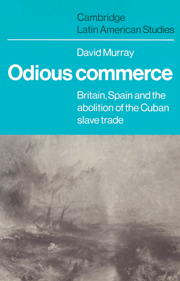Book contents
- Frontmatter
- Contents
- Tables
- Preface
- 1 The ‘opening’ of a legal trade
- 2 Parliament versus Cortes
- 3 Legality and illegality
- 4 The treaty of 1817
- 5 Enforcement and re-enforcement: the attempt to make the slave trade prohibition effective
- 6 The treaty of 1835
- 7 An abolitionist era
- 8 The Turnbull affair
- 9 The Escalera conspiracy
- 10 The penal law of 1845
- 11 Free trade and annexationism
- 12 The failure of the penal law
- 13 A new class of slaves
- 14 The abolition of the Cuban slave trade
- Abbreviations
- Notes
- Bibliography
- Index
- CAMBRIDGE LATIN AMERICAN STUDIES
12 - The failure of the penal law
Published online by Cambridge University Press: 16 October 2009
- Frontmatter
- Contents
- Tables
- Preface
- 1 The ‘opening’ of a legal trade
- 2 Parliament versus Cortes
- 3 Legality and illegality
- 4 The treaty of 1817
- 5 Enforcement and re-enforcement: the attempt to make the slave trade prohibition effective
- 6 The treaty of 1835
- 7 An abolitionist era
- 8 The Turnbull affair
- 9 The Escalera conspiracy
- 10 The penal law of 1845
- 11 Free trade and annexationism
- 12 The failure of the penal law
- 13 A new class of slaves
- 14 The abolition of the Cuban slave trade
- Abbreviations
- Notes
- Bibliography
- Index
- CAMBRIDGE LATIN AMERICAN STUDIES
Summary
Spain enacted the penal law of 2 March 1845 to fulfil her treaty obligations with Britain. For over twenty years it remained the only law under which Spanish officials in Cuba worked to suppress the slave trade. Not until February 1866 did a more extensive law, designed to replace the 1845 legislation, first appear in the Spanish Senate and another year passed before it received legislative sanction. The preamble of the 1866 bill admitted the inadequacies of its predecessor, a long overdue public acknowledgement of the obvious. For years, successive Captains-General had been saying the same thing in stronger terms contained in confidential despatches and letters to the peninsular government; even Spanish legal officials in Cuba, who earlier had defended the law, by the late 1850s and 1860s recognized its shortcomings. The British commissioners in Cuba and through them the British government had been the first to see what was later apparent to all; the 1845 penal law was a failure. Far from aiding in the suppression of the Cuban slave trade, the law actually encouraged what it was meant to stop.
Captain-General O'Donnell acknowledged receipt of the royal orders accompanying the penal law in a confidential despatch dated 15 February 1845. He warned of the grim prospects for Cuba if the enforcement of the law succeeded in cutting off the flow of slaves to the island. With the ratio of female to male slaves at 1:5, there was no possibility that natural reproduction would make up for the estimated 5% annual mortality among the plantation slaves.
- Type
- Chapter
- Information
- Odious CommerceBritain, Spain and the Abolition of the Cuban Slave Trade, pp. 241 - 270Publisher: Cambridge University PressPrint publication year: 1981

